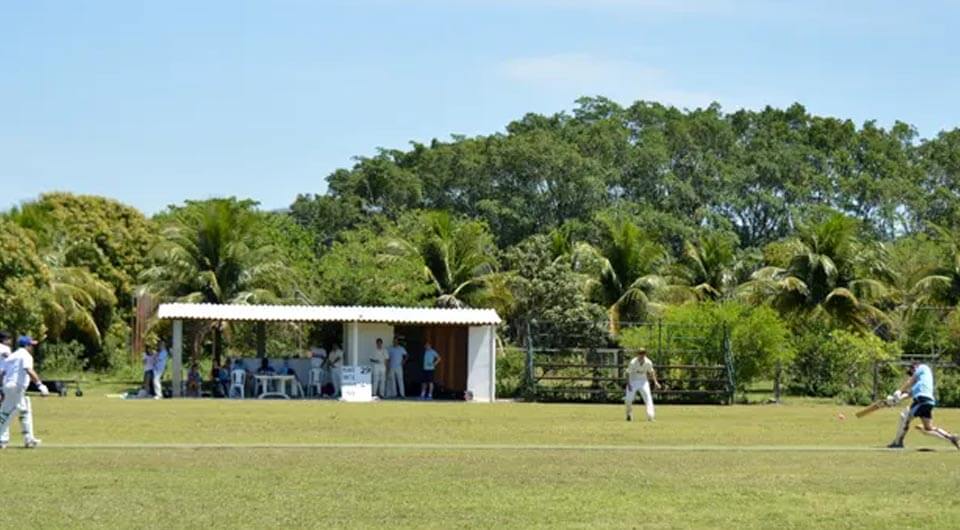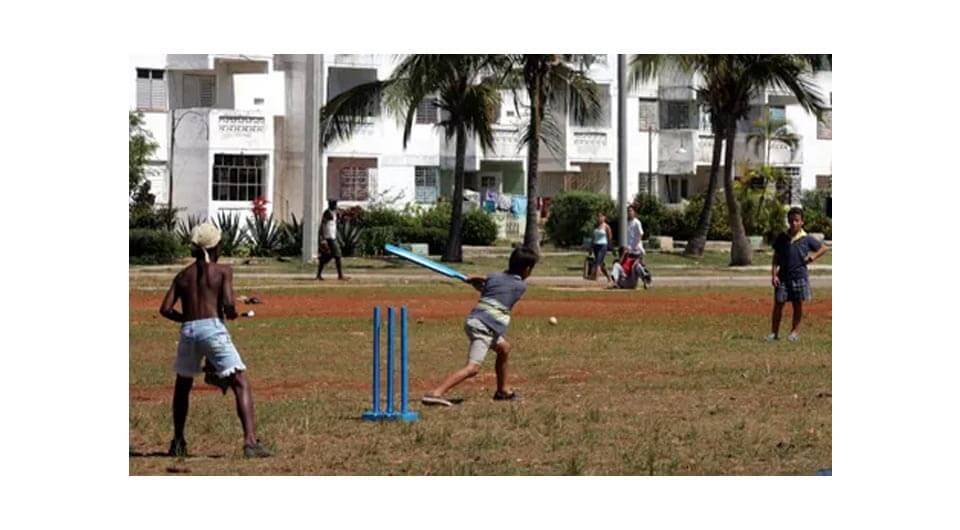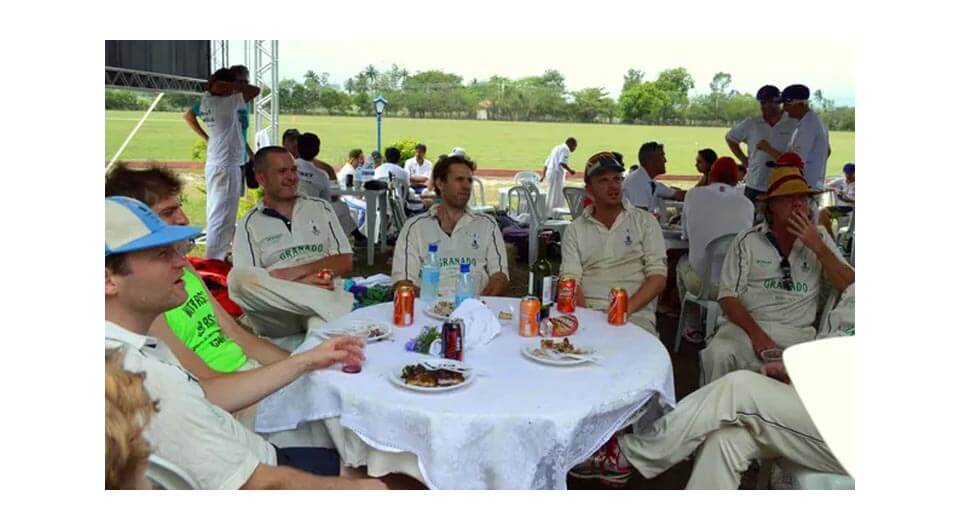Carioca Cricket Club no The Guardian International
Quer saber o que andam falando do Carioca Cricket Club no The Guardian International?
Cricket’s Brazilian outpost: how CCC thrive in the ‘corridor of sun certainty’
The rural backwater of Itaguaí is an unlikely hotbed of cricket, kept alive by expats and eccentricity and providing a world-class excuse for a party
In all of this there was a comforting sense of the ridiculous.” So wrote Peter Fleming in Brazilian Adventure, which – eight decades after it was published – is still the sharpest piece of travel writing in English about South America’s biggest nation.
He was lampooning a hare-brained expedition of foreigners that set off from Rio de Janeiro in 1932 but his words could just as easily describe the cricket match that took place last Saturday in the city’s remote suburb of Itaguaí.
The last game of the 2016 season for the Carioca Cricket Club (CCC) proved an occasion of high drama, rich entertainment and rank incompetence – even by the standards of a team who have rarely had reason to disturb the trophy cabinet.
Formed five years ago in the Pavão Azul (Blue Peacock) bar, the CCC – who have as their logo an image of Christ the Redeemer in an umpire’s jacket signalling a wide– is an anachronism wrapped in an anomaly inside an expat bubble that has doggedly found a niche in the most unpromising of circumstances.
Outside the Caribbean Latin America has always been considered a cricketing desert. Countless reasons are given for the sport’s failure to grip the popular imagination here: the colonial history is Spanish and Portuguese, rather than English; the geography – dominated by Amazonian forest and Andean mountains – is uninviting; the climate – ranging from the humid tropics to Antarctic Patagonia – is insufficiently temperate; megacities such as São Paulo and Mexico City are too crowded and chaotic to allow hectares to be set aside for pitches; and football is too dominant to allow any other sport to prosper (as the many empty seats at this year’s Rio Olympics appeared to affirm). The old Rio Cricket Club – founded in 1872 – now exist in name only, with all of their playing area taken by football pitches.
But through a mix of eccentricity, real-world denial and a passion for the game the CCC chairman and president – the long-term English residents Tobias Hanbury and Craig Allison – have overcome these excuses to build a set of cricket facilities that would do an English village club proud.
With sponsorship from a beauty-care products firm, the CCC now have a clubhouse with a corrugated roof (already punctured in several places after being struck by lofty sixes). There is a small tiered stand for spectators, a training net with a bowling machine, and a tennis court for visiting family members who need a diversion.
The location is in Itaguaí, a rural backwater with a tradition of imported esoteric activities. This is home to Rio’s only two Japanese Buddhist shrines and a polo club. It is in the latter that the CCC have set up base, hiring space for up to four ovals. The biggest drawback is that the venue is a 90-minute drive from where the players live, but an early-morning bus – complete with a bacon-butty service – is chartered on match days.
Despite the distant mountains and unusual flora and fauna, the set-up is comfortably familiar to the players, who are a mix of English teachers, diplomats, businessmen and logistics managers from Britain, India, Pakistan, Sri Lanka, Australia, New Zealand and South Africa. Only one regular, Felipe Lima de Melo, is Brazilian and the host nation’s team is largely comprised of foreigners (thanks to a rule that allows expats to represent the country of residence).
Itaguaí is now the headquarters of cricket in Brazil. In October it hosted the four-day South American cricket championship, an ICC-recognised event with 10 national teams. The trophy was won by Chile, after victory against the long-time Latin American force, Argentina. In the women’s final Brazil beat Argentina by 44 runs.
In April the Rio club staged the Brazilian national tournament, which was contested by teams from São Paulo (champions for seven of the past eight years), Curitiba and Brasilia, where the former Kent Cricket Board batsman and current Brazil captain, Matthew Featherstone, has set up a training programme in local schools.
The quality of the matches may be patchy (though there have been some remarkable individual performances, such as the double hat-trick by Asanka Bandara this year), but the CCC did win the national championship once, in 2013. More importantly, though, in true Rio style, these annual events are an excuse for a world-class party with gaucho style barbecues, horse-riding, giant bonfires, DJs and live bands until late into the night, when players and their partners retire to the nearby hotel or tents set up outside the boundary ropes.
Last Saturday’s game was a one-day, inter-club 20-over affair that looked doomed in the morning when play was so delayed by a tropical rainstorm that several players entertained themselves with catching practice using fruit knocked off the branches of a mango tree. But true to Itaguaí’s reputation as the “Corridor of Sun Certainty”, the clouds cleared, leaving only a waterlogged outfield and soggy run-ups.
It made for some abject cricket with the rare exceptions Asanka Bandara (three wickets), Charles Morphett (three wickets) and Freddie Brunt (a streaky 38 runs).
Extras were the second-highest scorer for both teams and the third best knock for Hamsters was by Nikolay Tchorbadjiysky, a Bulgarian who had batted only a couple of times in his life but was able to use tennis strokes to great effect.
In a field of puddles there were fumbles, tumbles and dropped catches, allowing the runs to tick along despite the slow outfield and the distraction of the Brazilian parachute regiment descending into a nearby field. Although the play was second-rate, the teams were perfectly matched, leaving a final over in which six runs or one wicket would have won it. Instead the bowlers failed to remove the tailenders and the batsmen failed to get the runs.
Faced by a scoreboard that read 99 all out versus 99 for 9, the captains and club directors were unsure how to proceed, Finally they decided to settle the match in a bowl-off. Every player on each team would have one attempt to hit the stumps. Whichever side scored the most hits would be declared winner.
Despite more than five centuries of combined experience, the 22 players could hit the stumps only once, Hamish McInnes’s singular display of accuracy winning the game for the Hamsters.
In the post-match churrasco and pool party the losing captain, Oliver Ballhatchet, lamented a missed opportunity. “We got some early wickets, then I had a rum-and-coke and I don’t remember the rest.”
Like many he is planning to leave Rio now the Olympics have been and gone. The exodus could make 2017 the toughest year yet for the Carioca club. But the adventure goes on. New players are being canvassed. And even if a coveted second national championship remains elusive, the club can perhaps find a little solace in another of Fleming’s aphorisms: “Even when hope was gone there were always the irony rations to fall back on.”




